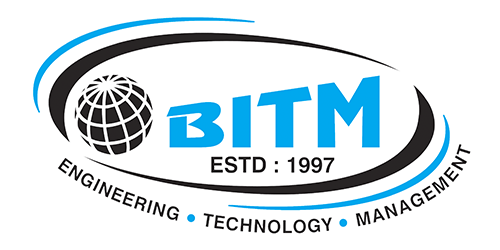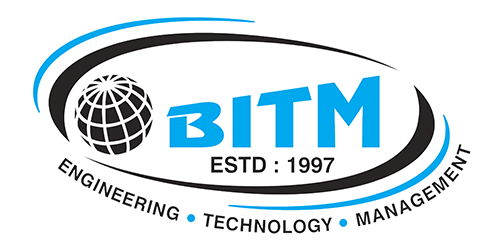
COMPUTER SCIENCE & ENGINEERING (ARTIFICIAL INTELLIGENCE)
Course Duration: 4 Years | Semesters: 8 |
-
Program Overview
-
HOD's Desk
-
Vision & Mission
-
PEO's
-
PO's
-
CO's
-
Teaching Faculty
-
Non-Teaching Faculty
-
Lab Details
-
Publications
-
Students List
-
Question Paper
-
Student Centric
Program overview
The Computer Science & Engineering (Artificial Intelligence) program is designed to equip students with the knowledge and skills to develop intelligent systems capable of mimicking human cognitive functions.
Key Program Highlights:
- Solid Foundation in Computer Science: Gain a strong understanding of core computer science concepts like algorithms, data structures, programming languages, software engineering, and computer architecture.
- In-Depth Exploration of AI & ML: Dive deep into the fascinating world of AI and ML, learning techniques for developing intelligent agents, building and training machine learning models, and applying deep learning architectures.
- Emphasis on Practical Applications: The program focuses on practical applications of AI and ML. You'll gain hands-on experience through coursework, projects, and potential internships, working on real-world problems in areas like computer vision, natural language processing, robotics, and intelligent systems.
- Development of Essential Skills: Sharpen your critical thinking, problem-solving, analytical, research skills, effective communication, teamwork, and ethical considerations in the development and deployment of AI solutions.
- Preparation for Rewarding Careers: This program equips you with the skills and knowledge sought after by leading companies and research institutions in the rapidly growing field of AI.
Benefits of the Program:
- Industry-Relevant Curriculum: Stay ahead of the curve with a curriculum that keeps pace with the latest advancements in AI and ML.
- Faculty Expertise: Learn from professors who are passionate about AI and actively involved in cutting-edge research.
- Project-Based Learning: Develop your practical skills through hands-on projects that tackle real-world AI challenges.
- Career Opportunities: can pursue careers in a wide range of fields including machine learning engineering, data science, natural language processing, robotics, and AI research and development

Dr. Rajashree V Biradar
Prof. & HOD
Department of CSE - Artificial Intelligence
As the Head of the Computer Science & Engineering (Artificial Intelligence) department, I want to extend my warmest greetings to all students enrolled in our program. Our department stands at the forefront of innovation, where we explore the ever-expanding frontiers of Artificial Intelligence (AI) and its applications in diverse fields.
CSE (Artificial Intelligence) department is stared in the academic year 2022-23 with the intake of 60. Subsequently in the academic year 2023-24, the intake has been increased to 120.Here at BITM, we offer a rigorous curriculum that blends the fundamentals of computer science with cutting-edge AI and Machine Learning (ML) techniques. You'll gain hands-on experience through coursework, projects, and potential internships, tackling real-world problems in areas like computer vision, natural language processing, robotics, and intelligent systems.
AI is not just a subject of study; it's a powerful tool that has the potential to revolutionize industries, improve lives, and solve some of the world's most pressing challenges. In our program, we strive to provide you with a comprehensive education that combines theoretical foundations with hands-on experience, enabling you to become proficient in the development and deployment of AI systems.
Our dedicated faculty consists of passionate researchers and industry experts who are committed to fostering your intellectual growth. They will guide you in developing the critical thinking, problem-solving, analytical, and research skills essential for success in AI. We also emphasize ethical considerations in AI development, ensuring you become responsible innovators who shape technology for a positive impact.
Finally, I want to remind you that your education extends beyond the classroom. Take advantage of research opportunities, internships, and extracurricular activities to deepen your understanding and broaden your skills. Collaborate with your peers, engage with faculty mentors, and immerse yourself in the vibrant community of AI enthusiasts.
Welcome again, and let's embark on this incredible exploration of Artificial Intelligence together!
VISION AND MISSION OF THE DEPARTMENT

Vision:
To contribute AI experts for global industries and organizations, fostering innovation while upholding social responsibility and ethical practices.

Mission:
- To nurture student with cutting-edge expertise through project based learning approaches.
- To foster industry-relevant design and development skills.
- To promote a culture of innovation and leadership skills while emphasizing ethical principles.
PEO-1: To harvest proficient AI professionals, contributing to major technological advancements and solutions in renowned companies or research institutions.
PEO-2: To exhibit professionalism through ethical innovation and leadership skills while encouraging interdisciplinary collaborations to address societal challenges.
PEO-3: To develop the ability to launch thriving AI based start-ups, and businesses across the world.
Program outcomes (POs)
PO1: Engineering knowledge: Apply the knowledge of mathematics, science, engineering fundamentals, and an engineering specialization to the solution of complex engineering problems.
PO2: Problem analysis: Identify, formulate, review research literature, and analyze complex engineering problems reaching substantiated conclusions using the first principles of mathematics, natural sciences, and engineering sciences.
PO3: Design/development of solutions: Design solutions for complex engineering problems and design system components or processes that meet the specified needs with appropriate consideration for public health and safety, and cultural, societal, and environmental considerations.
PO4: Conduct investigations of complex problems: Use research-based knowledge and research methods including design of experiments, analysis and interpretation of data, and synthesis of the information to provide valid conclusions.
PO5: Modern tool usage: Create, select, and apply appropriate techniques, resources, and modern engineering and IT tools including prediction and modeling to complex engineering activities with an understanding of the limitations.
PO6: The engineer and society: Apply reasoning informed by the contextual knowledge to assess societal, health, safety, legal & cultural issues and the consequent responsibilities relevant to the professional engineering practice.
PO7: Environment and sustainability: Understand the impact of professional engineering solutions in societal and environmental contexts, and demonstrate the knowledge of, and need for sustainable development.
PO8: Ethics: Apply ethical principles and commit to professional ethics & responsibilities and norms of the engineering practice.
PO9: Individual and team work: Function effectively as an individual, and as a member or leader in diverse teams, and in multi-disciplinary settings.
PO10: Communication: Communicate effectively on complex engineering activities with the engineering community and with society at large, such as being able to comprehend and write effective reports and design documentation, make effective presentations, and give and receive clear instructions.
PO11: Project management and finance: Demonstrate knowledge and understanding of the engineering and management principles and apply these to one's work, as a member and leader in a team, to manage projects and in multidisciplinary environments.
PO12: Life-long learning: Recognize the need for, and have the preparation and ability to engage in independent & life-long learning in the broadest context of technological change.
| Department of Computer Science and Engineering. ( Artificial Intelligence) | |||
| Course Outcomes (COs) | |||
| Course code | Course Name | CO-numbering | Statement |
| 22MDA31 | Graph theory and Discrete Mathematical Structures, Probability and Statistics
|
C301.1 | Understand and explain the basic concepts of graph theory.
|
| C301.2 | Understand an intense foundational introduction to fundamental concepts in discrete Mathematics. | ||
| C301.3 | Interpret, identify, and solve the language associated with logical structure, sets, relations and functions, modular arithmetic.
|
||
| C301.4 | Make use of the correlation and regression analysis to fit a suitable mathematical model for the statistical data.
|
||
| C301.5 | Applying discrete and continuous probability distributions in analyzing the probability models arising in engineering field.
|
||
| C301.6 | Construct joint probability distributions. | ||
| 22CA32
|
Digital System Design And Computer Organization
|
C302.1 | Illustrate different simplifying techniques in the design of combinational circuits. |
| C302.2 | Design various combinational and sequential digital circuits. | ||
| C302.3 | Design various counters using Flip-Flops. | ||
| C302.4 | Demonstrate the fundamentals of computer organization with machine instructions. | ||
| C302.5 | Elaborate the communication of input/output devices with computer system and solve arithmetic Operations using various techniques. | ||
| 22CA33 | Operating System
|
C303.1 | To introduce operating system, OS responsibilities, and OS services. |
| C303.2 | To discuss process concept, process scheduling techniques, and multi-threading concepts. | ||
| C303.3 | To demonstrate deadlock condition in the computer system, and usage of main memory. | ||
| C303.4 | To introduce virtual memory management concepts and file system. | ||
| C303.5 | To explain about secondary storage system and Linux OS as a case study. | ||
| 22CA34 | Data Structures And Applications
|
C304.1 | Explain the fundamentals of data structures and their applications to solve real life problems. |
| C304.2 | Demonstrate the working of linear and nonlinear data structures. | ||
| C304.3 | Write solutions to problems using linear data structures and nonlinear data structures. | ||
| C304.4 | Apply different data structures to solve given problem. | ||
| C304.5 | Develop skills to apply appropriate data structures in problem solving | ||
| 22CAL35 | Data Structures And Applications Lab
|
C305.1 | Illustrate implementation of basic operations on data structures. |
| C305.2 | Interpret Applications of different data structures. | ||
| C305.3 | Demonstrate data structures and their variants. | ||
| C305.4 | Illustrate various searching techniques using trees and graphs. | ||
| C305.5 | Develop skills to identify appropriate data structures to solve a given problem. | ||
| 22CA36 | Object Oriented Programming With Java | C306.1 | Learn fundamental features of object-oriented language and JAVA. |
| C306.2 | Learn object-oriented concepts using programming examples. | ||
| C306.3 | Study the concepts of importing packages, exception handling mechanism and multi threading. | ||
| C306.4 | Introduce event handling mechanism. | ||
| C306.5 | Create Graphical User Interface (GUI) applications using swings. | ||
| 22CA383 | R Programming
|
C308.1 | Explore and understand how R and R Studio interactive environment. |
| C308.2 | To learn and practice programming techniques using R programming. | ||
| C308.3 | Read Structured Data into R from various sources. | ||
| C308.4 | Understand the different data Structures, data types in R. | ||
| C308.5 | To develop small applications using R Programming. | ||
| 22BB41 | Biology For Engineers
|
C401.1 | To familiarize the students with the basic biological concepts and their engineering applications. |
| C401.2 | To enable the students with an understanding of bio design principles to create novel devices and structures. | ||
| C401.3 | To provide the students an appreciation of how biological systems can be re-designed as substitute products for natural systems. | ||
| 22CA42 | Principles Of Artificial Intelligence
|
C402.1 | Gain a historical perspective of AI and its foundations |
| C402.2 | Become familiar with basic principles of AI toward problem solving | ||
| C402.3 | Get to know approaches of inference, perception, Uncertain Knowledge and Reasoning. | ||
| C402.4 | Experience AI development tools such as an ‘AI language’, expert system shell, and/or data mining tool. | ||
| C402.5 | Experiment with a machine learning model for simulation and analysis. | ||
| 22CA43 | Database Management Systems | C403.1 | Learn and practice data modelling using entity relationship and developing database design |
| C403.2 | Practice SQL programming through a variety of database problems. | ||
| C403.3 | Apply normalization techniques to normalize the database | ||
| C403.4 | Demonstrate the use of concurrency and transactions in database | ||
| C403.5 | Design and build database applications for real world problems. | ||
| 22CA44 | Analysis And Design Of Algorithms | C404.1 | Describe basic concepts, notations, methods used in design and analysis of algorithms |
| C404.2 | Explain various algorithm design techniques. | ||
| C404.3 | Design and analyze the efficiency of a given problem using various design techniques. | ||
| C404.4 | Differentiate efficiency of different algorithm design techniques for a given problem. | ||
| C404.5 | Apply the suitable algorithm design technique for a given problem | ||
| 22CAL45 | Algorithms Lab | C405.1 | Demonstrate the basic concepts of Java Programming. |
| C405.2 | Illustrate Different Sorting Algorithm design techniques. | ||
| C405.3 | Solve Graph Applications using various design techniques. | ||
| C405.4 | Interpret combinatorial problems using Backtracking technique. | ||
| C405.5 | Develop skills to identify suitable algorithm design technique to solve a given problem | ||
| 22CA462 | Object Oriented programming With Python | C406.1 | Learn the syntax and semantics of Python programming language. |
| C406.2 | Illustrate the process of structuring the data using lists, tuples and dictionaries. | ||
| C406.3 | Demonstrate the use of built-in functions of file system. | ||
| C406.4 | Implement the Object Oriented Programming concepts in Python | ||
| C406.5 | Appraise the need for working with various documents like Excel, PDF, Word and Others. | ||
| S. No | Name | Designation | Experience (In Years) |
| 1 | Dr. RAJASHREE V BIRADAR | Professor - HOD | 32 |
| 2 | Mr. VIKRAM SANDEEP P | Assoc. Prof | 11 |
| 3 | Mr. BIMANNA A | Associate Professor | 10 |
| 4 | Mrs. AMRUTHA H | Assistant Professor | 03 |
| 5 | Ms. PREMA | Assistant Professor | 03 |
| 6 | Mr. RAMESH KUMAR K. R. | Assistant Professor | 07 |
| Lab Instructor | Mr. Gangaraju |
| Department Attender | Mr. Suresh |
| Name Of The Lab | CSE(AI) |
| Size in Square Meters | 181.18 |
| No. Of. Computer System | 70 |
| Configuration | DELL OPTIPLEX 3060 SFF, CORE I7-8TH GEN PROCESSOR, 16GB DDR4 RAM, 512 NVME SSD, 22 INCH DELL MONIOTOR KEYBOARD & MOUSE WI1 10/11 PRO |
| Lab Manual | Yes |
| Lab Instructor | Mr. Gangaraju |
| Staff In Charge | Mr. Rameshkumar K R |
Labs held in odd and even semesters:
- DS lab
- OS lab
- DBMS lab
- C & C++ lab
- Algorithms lab
- AI lab
- R programming
- Python programming

Quick Links
Contact us
Office: 08392-237158
Mobile: +91 9480723353
Mail ID: rajashreebiradar@bitm.edu.in
Mail ID:ms.rvb123@gmail.com
 Ranked #15
Ranked #15
Ranked as 15th Best Engineering College in Karnataka by Edu-Rand Magazine Engineering College Raknking 2015
ACCREDITATION
![]()
 Ranked #6
Ranked #6
Ranked 6th in Top 10 Private Colleges in Karnataka (https://pickacollege.digit.in/)

